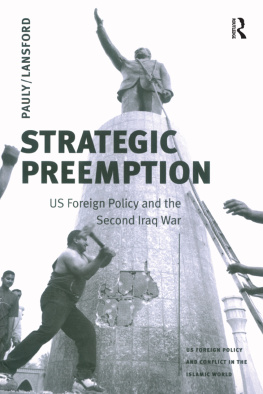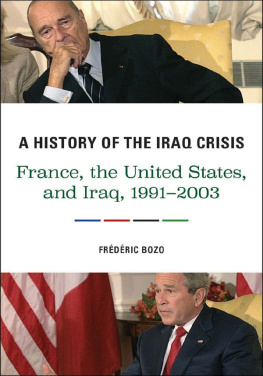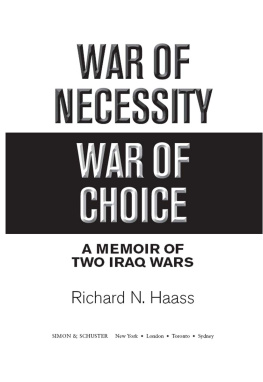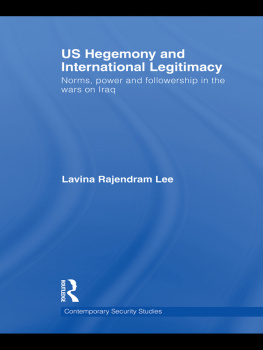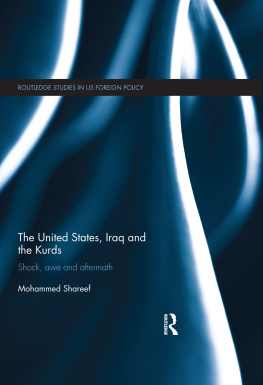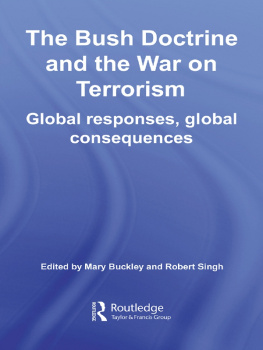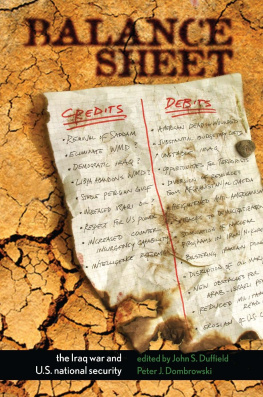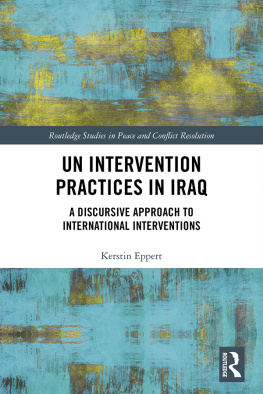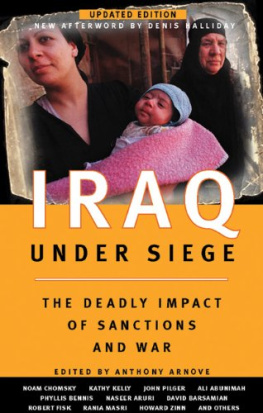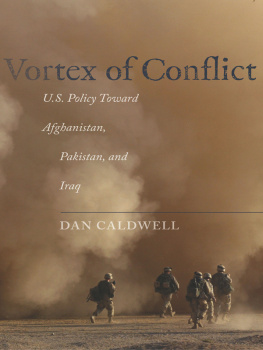STRATEGIC PREEMPTION
US Foreign Policy and Conflict in the Islamic World
Series Editors:
Tom Lansford
The University of Southern Mississippi-Gulf Coast, USA
Jack Kalpakian
Al Akhawayn University, Morocco
The proliferation of an anti-US ideology among radicalized Islamic groups has emerged as one of the most significant security concerns for the United States and contemporary global relations in the wake of the end of the Cold War. The terrorist attacks of September 11,2001 demonstrated the danger posed by Islamic extremists to US domestic and foreign interests. Through a wealth of case studies this new series examines the role that US foreign policy has played in exacerbating or ameliorating hostilities among and within Muslim nations as a means of exploring the rise in tension between some Islamic groups and the West. The series provides an interdisciplinary framework of analysis which, transcending traditional, narrow modes of inquiry, permits a comprehensive examination of US foreign policy in the context of the Islamic world.
Other titles in the series
Balancing Act
US Foreign Policy and the Arab-Israeli Conflict
Vaughn P. Shannon
ISBN 0 7546 3591 0
A Bitter Harvest
US Foreign Policy and Afghanistan
Tom Lansford
ISBN 0 7546 3615 1
US-Indonesian Hegemonic Bargaining
Strength of Weakness
Timo Kivimki
ISBN 0 7546 3686 0
Crossing the Rubicon
Ronald Reagan and US Policy in the Middle East
Nicholas Laham
ISBN 0 7546 3961 4
Strategic Preemption
US Foreign Policy and the Second Iraq War
ROBERT J. PAULY, JR.
Norwich University
TOM LANSFORD
The University of Southern Mississippi-Gulf Coast
First published 2005 by Ashgate Publishing
Published 2017 by Routledge
2 Park Square, Milton Park, Abingdon, Oxon OX14 4RN
711 Third Avenue, New York, NY 10017, USA
Routledge is an imprint of the Taylor & Francis Group, an informa business
Copyright Robert J. Pauly, Jr. and Tom Lansford 2005
Robert J. Pauly, Jr. and Tom Lansford have asserted their right under the Copyright, Designs and Patents Act, 1988, to be identified as the authors of this work.
All rights reserved. No part of this book may be reprinted or reproduced or utilised in any form or by any electronic, mechanical, or other means, now known or hereafter invented, including photocopying and recording, or in any information storage or retrieval system, without permission in writing from the publishers.
Notice:
Product or corporate names may be trademarks or registered trademarks, and are used only for identification and explanation without intent to infringe.
British Library Cataloguing in Publication Data
Pauly, Robert J.
Strategic preemption : US foreign policy and the second Iraq war. - (US foreign policy and conflict in the Islamic world)
1. Iraq War, 2003 2. United States - Foreign relations -2001- 3. United States - Foreign relations - Iraq 4. Iraq -Foreign relations - United States
I. Title II. Lansford, Tom
327.730567
Library of Congress Cataloging-in-Publication Data
Pauly, Robert J., 1967-
Strategic preemption : US foreign policy and the second Iraq war / by Robert J.
Pauly, Jr., and Tom Lansford.
p. cm. -- (US foreign policy and conflict in the Islamic world)
Includes bibliographical references and index.
ISBN 0-7546-3975-4 (hardback) -- ISBN 0-7546-4357-3 (pbk.)
1. Iraq War, 2003. 2. United States--Foreign relations--2001- I. Title: US foreign policy and the second Iraq war. II. Title: United States foreign policy and the second Iraq war. III. Lansford, Tom. IV. Title. V.
Series: US foreign policy and conflict in the Islamic world series.
DS79.76.P34 2004
327.73056709051 1--dc22
2004012585
ISBN 13: 978-0-7546-4357-9 (pbk)
ISBN 13: 978-0-7546-3975-6 (hbk)
Contents
As is true with any project of this nature, it could only have been completed with the help and support of a number of individuals. The authors wish to thank Ms Kirstin Howgate of Ashgate Publishing for her guidance and patience through the preparation of the manuscript. They would also like to especially thank Mr Jack Covarrubias of Old Dominion University for his editing assistance. Robert J. Pauly, Jr., would like to express his thanks to his parents, brothers and sister-in-law, for their love and support. I would also to thank my graduate students at Norwich University for their instructive feedback and suggestions. Finally, I thank Kelly Whitlock for her friendship, kindness and hospitality.
Tom Lansford is extremely grateful to Mr James D. Buffett for assistance with the writing process. I would also like to express my deep thanks to Dr Denise von Herrmann for her support during his project and also wish to thank Dr Elliott Pood for providing the release time which allowed me to complete this work. I wish to acknowledge Kyle Bromwell, Drew Lucas, Mike Pappas and Ross Rutt. I would further like to extend a special note of thanks to Mr John Shinn, Go Saints! Finally, as always, I must thank Amber for the past, present and future.
For the servicemen and women of Operation Iraqi Freedom
Post-Cold War US Security Policy and Iraq
Since the end of the Cold War, US security policy in the Persian Gulf has been dominated by the issue of Iraq. During the waning days of the superpower conflict, Iraq was a pawn in the great bipolar struggle for influence in the region. Iraq emerged as a diplomatic battleground between the United States and the Soviet Union, and it became a key ingredient for US strategies to contain Iran and the growth of anti-American fundamentalism in the Gulf. Saddam Husseins invasion of Kuwait quickly proved that his interests did not necessarily match those of Washington and the subsequent international conflict to liberate Kuwait came to be only the first step in a decade long effort by the United States to contain Iraq. Hence, instead of using Iraq to contain Iran, US policy evolved into one of dual containment of both Iraq and Iran.
US-Iraqi relations through the 1990s were marked by constant strife, both rhetorical and physical, which escalated into a struggle for regional power between the worlds sole remaining superpower and a weakened, but still respected and potentially potent, former regional hegemonal contender. Throughout these contests, Saddam was often able to achieve short-term victories or to turn defeats into public relations successes through adroit maneuvering and manipulation of popular perceptions in the Gulf states and the broader Middle East. In doing so, he emerged by the end of the 1990s as a leading figure of pan-Arab nationalism, in spite of his brutal repression of Iraqi Shiites. Meanwhile, moderate Arab leaders, such as Hosni Mubarak of Egypt or King Hussein of Jordan (and later, his son, Abdullah II) have been increasingly viewed as too pro-American or too tied to the West in general.
The Grand Coalition
While positive perceptions of Saddams reputation grew in the Arab street in the post-Cold War era, the United States faced increased criticism and greater constraints on its role in the Middle East in general, and specifically in the Persian Gulf. To some degree, the highwater mark for US influence was exemplified by the 19901991 anti-Saddam coalition. The first anti-Saddam military coalition or Grand Coalition reflected the unparalleled military and diplomatic strength of the United States at the dawn of the post-Cold War period. The administration of George H.W. Bush was able to draw together a broad and multifaceted coalition of traditional American allies and a range of states that had adversarial relations with Washington.

